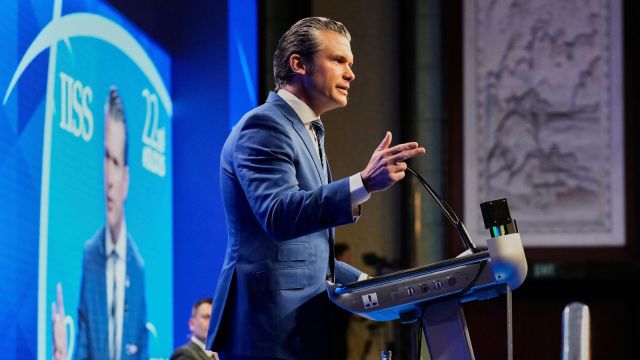Stay updated with the latest - Click here to follow us on Instagram
Hegseth warns of ‘imminent’ China threat, tells Asian allies: Spend more on defence
Hegseth also pushed US allies in the region to spend more on their own security.
 'We are postured defensively in the region to be strong in pursuit of a peace deal. And we certainly hope that's what happens here,' Hegseth said. (AP)
'We are postured defensively in the region to be strong in pursuit of a peace deal. And we certainly hope that's what happens here,' Hegseth said. (AP)US Defence Secretary Pete Hegseth has warned that China poses a real and possibly immediate threat, and urged countries in the Indo-Pacific to increase their defence spending.
Speaking at the Shangri-La Dialogue in Singapore on Saturday, Hegseth said the Indo-Pacific remains a top priority for the Trump administration. It was his first appearance at the annual forum, which brings together defence leaders and diplomats from across Asia.
“There’s no reason to sugar coat it. The threat China poses is real, and it could be imminent,” Hegseth said, according to Reuters. He added that any Chinese attempt to take control of Taiwan “would result in devastating consequences for the Indo-Pacific and the world,” and repeated President Trump’s position that China would not invade Taiwan while he is in office.
China sees Taiwan as part of its territory and has said it could use force if necessary to bring the island under its control. It has been holding more military drills near Taiwan in recent months. Taiwan’s government says only its people can decide the island’s future.
Hegseth said: “It has to be clear to all that Beijing is credibly preparing to potentially use military force to alter the balance of power in the Indo-Pacific.”
China responded to the comments, calling them provocative. “Mr. Hegseth repeatedly smeared and attacked China and relentlessly played up the so-called ‘China threat’,” the Chinese embassy in Singapore said in a statement posted on Facebook. “As a matter of fact, the US itself is the biggest ‘troublemaker’ for regional peace and stability.”
Hegseth also pushed US allies in the region to spend more on their own security. His remarks may raise concerns among partners, although the audience in Singapore was described as relatively receptive. China sent only an academic delegation to the event, skipping high-level participation.
This is not the first time Hegseth has urged allies to increase defence budgets. In February, at a press conference in Brussels, he said Europe should not treat the US “like a sucker.”
On Friday, French President Emmanuel Macron said during a keynote address that Hegseth was right to call for more European defence spending.
Hegseth said NATO members were now pledging to spend up to 5 per cent of GDP on defence. “Even Germany,” he noted, adding, “So it doesn’t make sense for countries in Europe to do that while key allies in Asia spend less on defence in the face of an even more formidable threat, not to mention North Korea.”
Dutch Defence Minister Ruben Brekelmans welcomed Hegseth’s recognition that European nations were increasing defence investment. “It was for me maybe the first time or one of the first times I heard the US administration acknowledge this explicitly,” he told Reuters.
But some in the US delegation voiced concern about the tone of Hegseth’s speech. Democratic Senator Tammy Duckworth, who is co-leading a bipartisan delegation to the forum, said his message about regional commitment was clear, but the way he addressed allies was unhelpful. “I thought it was patronising of our friends in the Indo-Pacific in particular,” she said.
According to a study by the London-based International Institute for Strategic Studies, which runs the forum, several Asian countries are already increasing spending on weapons and defence technology. Still, defence spending in the region remained steady at around 1.5% of GDP in 2024.
Hegseth said Europe should focus its defence efforts on its own region, allowing the US to concentrate more on the Indo-Pacific. “We would much prefer that the overwhelming balance of European investment be on that continent,” he said, “so that… we’re able to use our comparative advantage as an Indo-Pacific nation to support our partners here.”
Hegseth also said the US is not trying to impose its politics or culture on other countries. “We are not here to pressure other countries to embrace or adopt our politics or ideology,” he said. “We are not here to preach to you about climate change or cultural issues. We respect you, your traditions and your militaries. And we want to work with you where our shared interests align.”




- 01
- 02
- 03
- 04
- 05


























